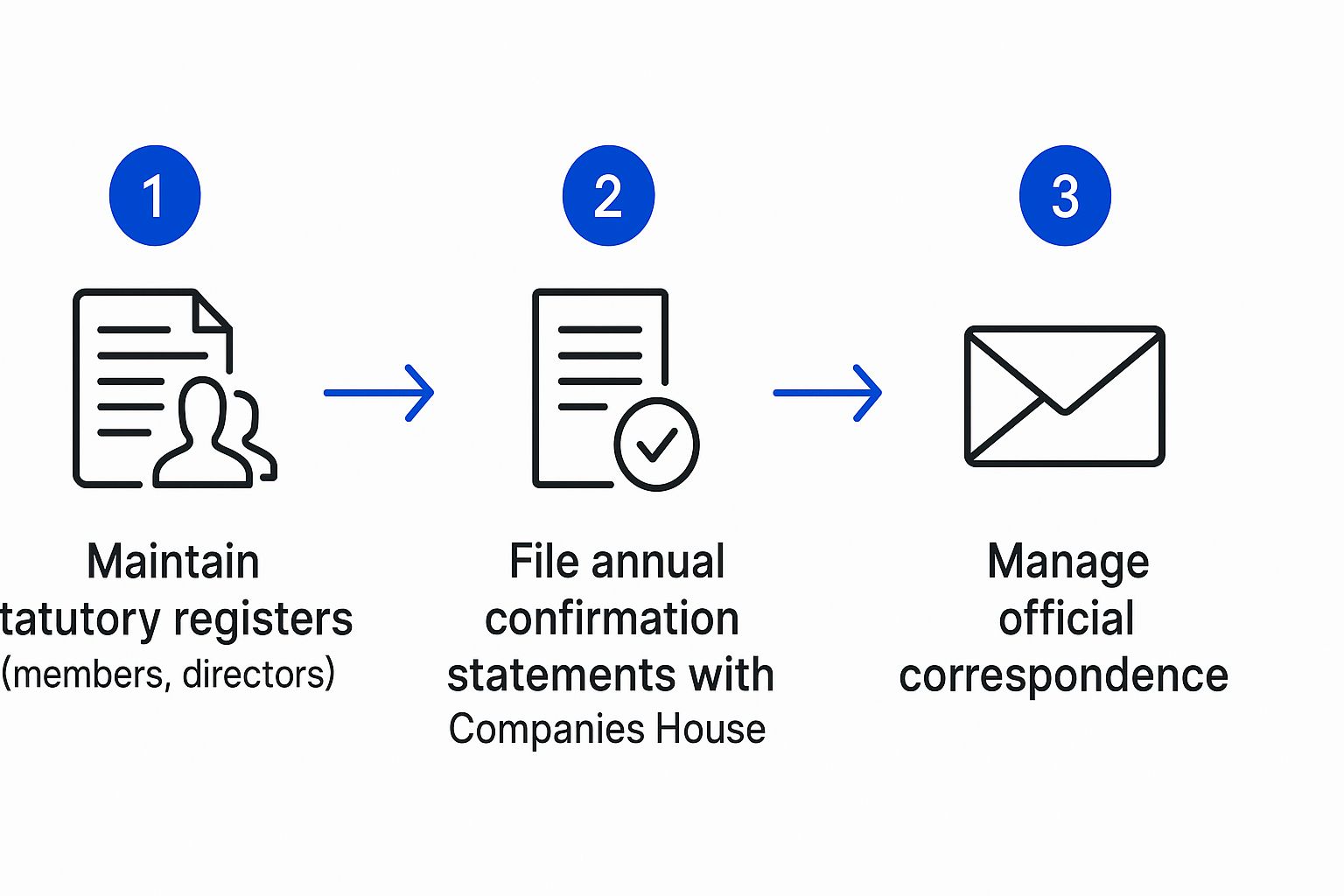UK Company Secretary Duties and Responsibilities
UK Company Secretary Duties and Responsibilities – The company secretary is the backbone of any well-run organisation, making sure it sticks to corporate law, keeps its statutory records in order, and gives the board of directors the support they need. Think of them as the central point of contact for good governance, ensuring every decision is made ethically and, most importantly, legally.
The Modern Company Secretary: More Than Just a Note-Taker

Forget that old-fashioned picture of someone quietly taking notes in the corner. The modern company secretary is the strategic guardian of corporate governance—the ‘air traffic controller’ for the boardroom, you could say. They manage the complex flow of information, help the company navigate tricky regulatory airspace, and guide the board towards sound, compliant decisions.
This role has moved way beyond simple admin. By 2025, company secretaries are expected to be deeply involved in strategic governance, risk management, and making the board more effective. Their work now includes everything from director onboarding to carrying out board evaluations to boost performance.
The Strategic Heart of the Business
A great company secretary is worth far more than just ticking legal boxes. They are the conscience of the company, a chief advisor to the board, and the person who makes good governance a reality. Their work really boils down to a few key areas:
- Statutory Compliance: Making sure all legal filings with Companies House are spot-on and on time, from annual confirmation statements to changes in directors.
- Board Support: Getting meeting agendas ready, compiling detailed board packs, and taking accurate minutes that clearly capture decisions and action points.
- Corporate Records: Looking after all the statutory registers and official company documents. These are crucial records, often kept securely at the company’s official address. You can learn more about the legal requirements for a registered office in our detailed guide.
- Advisory Services: Guiding the board on its legal and fiduciary duties, advising on best practices in corporate governance, and keeping directors up to speed with any changes in the law.
To give you a clearer picture, here’s a quick breakdown of what these responsibilities look like day-to-day.
Key Responsibilities at a Glance
| Responsibility Area | Core Function | Practical Example |
|---|---|---|
| Statutory & Regulatory | Ensuring full compliance with the Companies Act and other relevant legislation. | Filing the annual Confirmation Statement with Companies House before the deadline. Actionable insight: use a compliance calendar with automated alerts set 30 days before key deadlines to avoid penalties. |
| Board & Committee Support | Facilitating effective meetings and decision-making processes. | Preparing and distributing board packs with agendas and reports 7 days before a meeting, allowing directors time to review and come prepared for focused discussions. |
| Corporate Records | Maintaining accurate and up-to-date statutory registers and company records. | Updating the PSC (Persons with Significant Control) register within 14 days of being notified of a change. For example, if a shareholder’s stake increases from 20% to 30%, record this promptly. |
| Shareholder Relations | Managing communication between the company and its shareholders. | Organising the Annual General Meeting (AGM), including sending notices and managing proxies. A practical step is creating an AGM project plan with milestones for notice periods, proxy deadlines, and venue booking. |
Managing Statutory and Administrative Duties
Beyond offering high-level strategic advice, the real bread and butter of a company secretary’s role is managing the essential statutory and administrative tasks that keep a company compliant. Think of this as the bedrock of good governance; get this wrong, and the entire corporate structure is on shaky ground. These are the non-negotiable legal obligations that demand absolute accuracy and timeliness.
This work boils down to maintaining the company’s official records, known as statutory registers. These aren’t just dusty files in a cabinet; they are the living, legal proof of the company’s structure, ownership, and history.
Maintaining Impeccable Corporate Records
A company secretary is the official keeper of several crucial registers. These must be meticulously kept up-to-date and be ready for inspection at a moment’s notice. The most important of these include:
- Register of Members: A definitive list of all shareholders, both past and present.
- Register of Directors: Details of every director ever appointed to the board.
- Register of Secretaries: Information on the appointed company secretary.
- PSC Register: A record of ‘Persons with Significant Control’ over the company—a key transparency requirement.
- Register of Charges: A log of any mortgages or loans secured against the company’s assets.
Keeping these registers in order is a continuous job. Every time a director is appointed, a shareholder sells their shares, or the company takes out a new loan, it’s the secretary’s responsibility to record the change without delay.
Practical Example: Appointing a New Director
When a new director joins the board, it triggers a multi-step compliance process, not just a quick update to a list. The secretary needs to:
- Get it in Writing: Ensure a Board Resolution is passed and properly documented in the meeting minutes.
- Tell Companies House: Complete and file the correct form (Form AP01) with Companies House within 14 days of the appointment. Miss this deadline, and you’re already non-compliant.
- Update the Books: Immediately update the company’s internal Register of Directors and Register of Directors’ Residential Addresses.
- Notify Key Parties: Let the company’s insurers and sometimes the bank know about the change in leadership.
This simple example shows how a single decision translates into a series of concrete, time-sensitive tasks. The company secretary is the one who connects the dots to ensure everything is done by the book.
Filing with Companies House
One of the most visible administrative duties is managing all filings with Companies House, the UK’s registrar of companies. The big one here is the annual confirmation statement. This isn’t just paperwork; it’s a legal declaration confirming that all the information held by Companies House about your company is correct on a specific date.
Failing to file on time can have serious repercussions. We’re talking fines, potential prosecution of directors, and in the worst-case scenario, the company being struck off the register entirely. If you want to dive deeper into this critical filing, you can explore our detailed guide on the Confirmation Statement and its requirements.
This infographic gives a great visual overview of the core administrative workflow a company secretary manages.

As you can see, diligent record-keeping is the starting point that feeds directly into timely compliance filings and clear communication, heading off costly errors before they happen.
An actionable insight is to create a compliance calendar. This tool maps out every key filing date for the year—such as the Confirmation Statement, annual accounts, and tax deadlines—with automated reminders set well in advance. For example, set a first reminder 6 weeks before a deadline to gather information, and a final reminder 1 week before to file. It’s a lifesaver that prevents last-minute panic.
Driving Effective Board and Shareholder Meetings

A huge part of a company secretary’s job is to turn routine meetings into productive, decision-driving events. This role goes way beyond just taking notes. Think of them as the architect of the entire meeting process, making sure every discussion is focused, compliant, and actually moves the business forward.
Without this guiding hand, board meetings can easily descend into chaos, wasting the incredibly valuable time of the company’s most senior leaders.
The secretary’s work kicks off long before anyone steps into the boardroom. They’ll work hand-in-glove with the Chair to build a sharp, strategic agenda that puts critical issues front and centre, pushing the day-to-day operational noise to the side. An actionable tip here is to circulate a draft agenda to the board for input two weeks before the meeting, ensuring all critical items are captured.
Preparing for Success Before the Meeting
You can always spot a great company secretary by how well they prepare for a meeting. It’s a meticulous process of gathering information, organising documents, and getting directors up to speed to set the stage for a successful outcome. This groundwork prevents those last-minute scrambles and means board members arrive fully briefed and ready to contribute.
The key deliverable here is the board pack. This is a comprehensive bundle of documents sent out to directors, usually about a week in advance. It’s not just a random pile of papers; it’s a curated set of information designed to inform and guide the upcoming debate.
A solid board pack will almost always include:
- A Clear Agenda: This lays out the topics for discussion, who is leading each point, and a suggested time for each item.
- Previous Minutes: For approval and to quickly review action points from the last get-together.
- Management Reports: Covering financial updates, operational performance, and the status of key projects.
- Supporting Papers: Any specific documents related to agenda items, like an investment proposal or a policy that needs reviewing.
The quality of the board pack has a direct impact on the quality of the meeting. A clear, concise, and timely pack is one of the most powerful tools a company secretary has to promote good governance.
Orchestrating the Meeting and Capturing Outcomes
Once the meeting starts, the company secretary shifts into the role of procedural guide. They ensure everything sticks to the company’s articles of association, confirm that a quorum (the minimum number of directors needed) is present, and advise the Chair on any governance questions that pop up. Their presence frees up the Chair to focus completely on leading the discussion.
But perhaps their most critical task during the meeting is taking the minutes. This isn’t a word-for-word transcript; it’s a precise legal record of what was discussed and, more importantly, what was decided.
Practical Example: Action-Oriented Minutes
Instead of a vague entry like, “The board discussed the marketing budget,” effective minutes capture clear outcomes. A much better entry would be: “Following a presentation by the Head of Marketing, the Board resolved to approve the Q3 marketing budget of £50,000. Action: The CFO is to release the funds by 5th July. Action: The Head of Marketing will present a Q3 performance review at the next board meeting.”
This approach creates real accountability. It clearly documents decisions, assigns responsibility to specific people, and sets firm deadlines.
After the meeting, the secretary circulates a draft of the minutes for review and makes sure every action point is logged and tracked. A useful insight is to use an “Action Log” spreadsheet to track each task, its owner, deadline, and current status, which can be reviewed at the start of every subsequent meeting.
Guarding Corporate Governance and Compliance

While sorting out meetings and statutory filings are fundamental parts of the job, a company secretary’s most vital role is to act as the company’s governance conscience. They are the chief advisor to the board, offering indispensable guidance on legal duties, directors’ responsibilities, and the constantly shifting world of UK company law.
Think of them as a crucial safeguard for both the business and its directors. They make sure the board not only understands its obligations but operates ethically and transparently, protecting the company from legal penalties and reputational damage. This is a proactive role, not a reactive one.
Navigating Legal and Ethical Complexities
A company secretary is tasked with keeping the board fully briefed on its duties under the Companies Act 2006 and any other relevant legislation. This covers everything from navigating directors’ conflicts of interest to keeping up with the latest governance codes. Their advice helps build a solid framework of accountability that sits behind every major business decision.
This responsibility also means staying ahead of new legal requirements, like the growing push for transparency in corporate structures. For instance, recent changes mean understanding when and how directors must verify their identity is no longer a footnote but a core compliance task.
A company secretary’s real value lies in translating complex legal jargon into practical, actionable advice for the board. They don’t just quote the law; they explain what it actually means for the business and how to comply with it on the ground.
This ensures directors can lead with confidence, knowing they have an expert guiding them through the regulatory maze.
A Practical Scenario: New Legislation
Imagine the government introduces new legislation demanding greater transparency in supply chains. This is a perfect example of where a company secretary really proves their worth.
Here’s a likely breakdown of how they’d handle it:
- Analyse and Interpret: First up, they’d dissect the new law to get to the bottom of its exact impact on the company’s operations, reporting requirements, and potential liabilities.
- Brief the Board: Next, they would prepare a clear, concise summary for the board. This briefing would skip the legalistic language and focus squarely on the key changes and what they mean for the business. This could be a one-page “at a glance” document.
- Recommend Action: Finally, they would propose a practical plan to get compliant. This might involve updating supplier contracts, amending internal policies, and setting out new procedures for the annual report, including a clear timeline for implementation.
In this situation, the secretary acts as the bridge between external regulation and internal strategy. They don’t just flag a problem; they provide a clear roadmap to a solution, reinforcing their role as a proactive guardian of the company’s integrity.
Their work in managing potential conflicts of interest is also critical. By maintaining a register of interests and advising directors when they should step back from certain decisions, they uphold the impartiality that is absolutely essential for good governance and stakeholder trust.
Skills and Career Path of a Company Secretary
Beyond simply knowing the duties and responsibilities, a successful career as a company secretary really hinges on a unique mix of technical know-how and interpersonal finesse. This isn’t a role where you can just hide behind law books; it demands the wisdom to apply that knowledge with diplomacy, discretion, and a real eye for strategy.
To get ahead, you have to master both the ‘hard’ and ‘soft’ skills of the trade. The hard skills are your foundation—a deep, almost encyclopaedic grasp of the Companies Act 2006, corporate law, and financial principles. These are non-negotiable.
But it’s the soft skills that truly separate a good company secretary from a great one. We’re talking about flawless communication, unwavering discretion, and the subtle art of influencing senior leaders without stepping on toes.
Essential Skills for the Modern Secretary
A top-tier company secretary is a well-rounded professional, just as comfortable navigating the dense legal archives as they are holding their own in the boardroom. Their skill set is a potent combination of technical mastery and genuine human insight.
- Attention to Detail: From the precise wording in board minutes to hitting every single filing deadline, accuracy is everything. There’s no room for error. A practical tip is to use checklists for recurring tasks like meeting preparation or statutory filings to ensure no step is missed.
- Organisational Acumen: You’re juggling board meetings, compliance calendars, shareholder communications, and a dozen other moving parts. Exceptional planning isn’t just a nice-to-have; it’s essential.
- Integrity and Discretion: As the custodian of a company’s most sensitive information, trustworthiness is the cornerstone of your reputation.
- Commercial Awareness: You can’t give relevant governance advice if you don’t understand the business and the industry it operates in. It’s about connecting the legal dots to the commercial reality. For instance, understanding market trends allows you to advise on the governance implications of a potential merger or acquisition.
Mapping a Typical Career Trajectory
The journey to becoming a senior company secretary is a progressive climb, where you build experience and responsibility at each rung of the ladder. It often starts in a more supportive role, giving you time to learn the ropes before you take on heavier strategic duties.
A typical career path might unfold something like this:
- Trainee/Assistant Company Secretary: This is where you learn the fundamentals. The focus is on administrative tasks like maintaining statutory registers and helping with the logistics of meetings.
- Company Secretary/Governance Manager: At this stage, you take full ownership of compliance for a company or a division, acting as the key advisor to the board.
- Deputy/Group Company Secretary: This role is usually found in a larger, often listed, organisation. You’d be overseeing governance for multiple entities and mentoring more junior staff.
This path ultimately leads to senior leadership roles where the company secretary acts as a critical advisor to the board of a major corporation. As you’d expect, the financial rewards reflect this ever-increasing responsibility.
According to recent salary data for UK company secretaries, pay can vary significantly depending on your experience and where you’re based. In London, for instance, the average annual salary sits somewhere between £85,000 and £150,000, with seasoned professionals in top roles earning upwards of £180,000 a year. You can dive deeper into the numbers by checking out this comprehensive 2025 report.
A Few Common Questions
Is a Company Secretary Legally Required in the UK?
This is a really common point of confusion. For a public limited company (PLC), the answer is a clear yes – the Companies Act 2006 makes appointing a qualified company secretary a legal must.
But for private limited companies (LTDs), things changed back in 2008. Since then, there’s no legal obligation to have one. The catch? The duties themselves don’t just vanish. Someone still has to do the work, and that responsibility usually lands on one of the directors. It’s why so many private firms still choose to appoint a secretary, even when they don’t have to – it’s just good governance.
What Qualifications Do I Need to Be a Company Secretary?
For PLCs, the rules are strict. You need to be properly qualified. That typically means you’re a solicitor, barrister, accountant, or a member of a recognised professional body like The Chartered Governance Institute UK & Ireland (CGI).
With private companies, there are no formal hoops to jump through. That said, you can’t just wing it. A solid grasp of company law and corporate governance is non-negotiable if you want to do the job properly and keep the company out of trouble.
Can a Director Also Be the Company Secretary?
In a private limited company, absolutely. It’s quite common for a director to wear both hats.
There’s just one important exception: if you are the sole director of the company, you cannot also be the company secretary. It’s a simple rule designed to ensure there’s at least a basic separation of duties at the top.
Navigating the maze of corporate compliance can feel overwhelming. Acorn Business Solutions provides expert company formation and corporate services to make sure your business stays compliant right from the start. Let us handle the admin, so you can get back to focusing on growth. https://acornbusinesssolutions.com
This table just scratches the surface, but it shows how the company secretary’s role connects the legal nuts and bolts to the company’s strategic direction.
A skilled company secretary doesn’t just manage processes; they build a framework of integrity and accountability that supports the entire organisation. They provide the structure that allows directors to focus on strategy and growth with confidence.
Ultimately, they are the vital link between the company’s management, its board of directors, and its shareholders, ensuring everyone is on the same page. This work is absolutely fundamental to building trust and protecting the company’s hard-earned reputation.
Blog Categories
- Startups
- Sales & Marketing
- Leadership
- Finance & Accounting
- Technology & Innovation
- Customer Experience
- Sustainability & Ethics
- Personal Development
- Success Stories
- Legal & Compliance
- Hiring & HR
- Small Business Tips
- E-Commerce
- Networking
- Acorn Insights
- Industry News
Related Topics
Professional Indemnity Insurance
Discover what is professional indemnity insurance, why your business needs it, and how it shields you from costly client claims.
What is a company secretary
Moving home? Learn how do you redirect your mail with Royal Mail or private services. A practical guide to costs, setup,
How Do You Redirect Your Mail in the UK?
Moving home? Learn how do you redirect your mail with Royal Mail or private services. A practical guide to costs, setup,
Top accounting courses for small business in the UK (2025)
Discover accounting courses for small business in the UK. Compare top options, pricing, and formats
UK Business Bank Accounts With No credit Checks
Discover UK business bank accounts with no credit checks. This guide explains your options and eligibility
Managing cash flow for small business: Quick tips
Discover managing cash flow for small business with practical steps to forecast, optimize liquidity,






